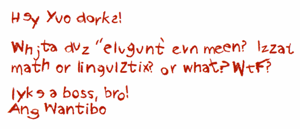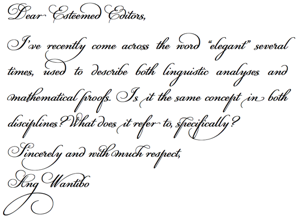


To the Editors of Speculative Grammarian,
I’m writing to convey my intense displeasure at the editing my recent letter to this very department received. I choose my words carefully, and I do not appreciate you replacing “thunderstruck” with “thick”, adding commas around “I’ve heard some claim”, replacing underlined “the theory” with italicized “the theory!”, lowercasing “What?”, curling my apostrophes, removing my double spaces after every sentence, or replacing my double hyphens with em dashes. I bet you are the kind of people who would move commas outside of quotes against an author’s wishes as well! At least you didn’t change the intent of my missive by removing or adding text that wasn’t even mine!
You are all exquisitely delightful.
Sincerely,
Noarn Chornsky
Dear Gnome,
It’s not our job to educate our readers (or letter writers) on the proper punctuation and typography of Standard Written Linguistics
Your letter escaped nearly unscathed. Here’s a letter typical of those we receive every month:

We have to edit into something like this before presenting it to the editorial board for a response:

So shut your pie hole or we’ll really put the screws to you next time.
—The “Letters” Interns
Speculative Grammarian accepts well-
Dear Eds,
I’ve been following The Speculative Grammarian Survey of Grammar Writers with a mix of horror and fascination. One thing that surprised me was the fact that in Report 2, “participle” wasn’t included along with “converb” and “antipassive” among the terms used by grammar writers despite not knowing what they meant. Care to share more detail?
Thanks,
Modulo Votangus
Äteritsiputeritsipuolilautatsijänkä, Finland
Dear %,
Unlike, say, the “antipassive”, “participle” has no actual meaning, and thus despite the fact that
virtually all grammar-
—Eds.
Dear Esteemed Editors,
I’ve recently come across the word “elegant” several times, used to describe both linguistic analyses and mathematical proofs. Is it the same concept in both disciplines? What does it refer to, specifically?
Sincerely and with much respect,
Ang Wantibo
Many linguists think of “elegant” as a linguistics term, while mathematicians and computer scientists (as well as the linguists’ and computer scientists’ bastard offspring, computational linguists) also claim it for their own. The concept is generally the same across disciplines, though the specific aspects of a “solution”
Underlyingly,* elegance is a matter of simplicity that begets explanatory power, while being theoretically felicitous and easily comprehensible. Or, more succinctly, ‘elegant’ in this sense is synonymous with ‘satisfying Occam’s Razor’, which is also synonymous with ‘nothing’.
—Eds.
* Mathematicians and computer scientists, read “abstractly”; computational linguists, read “smarter-